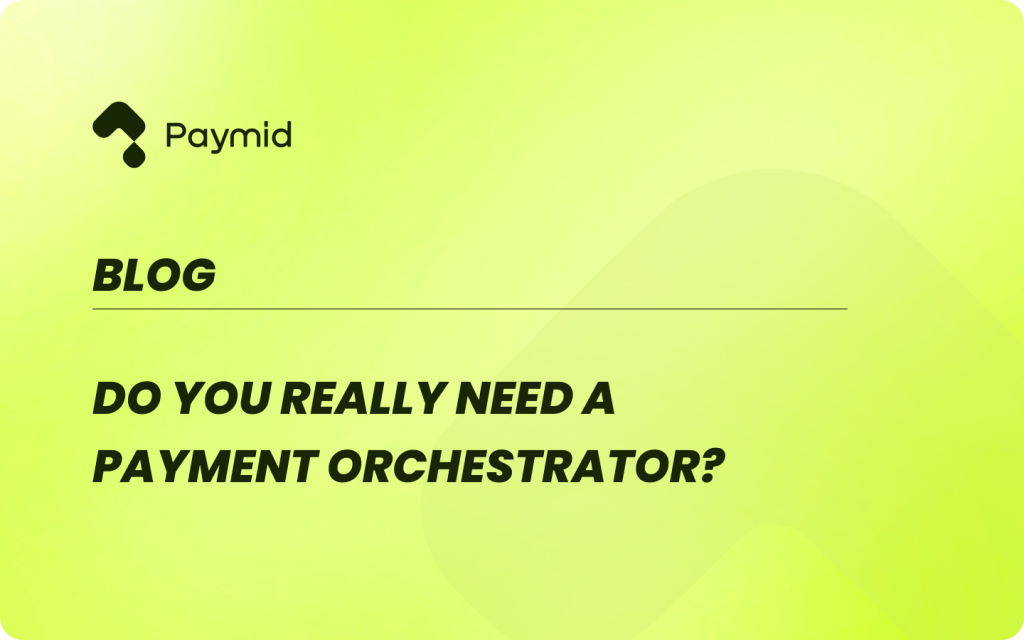Do You Really Need A Payment Orchestrator?

For businesses handling online payments, choosing the right infrastructure can make or break operational efficiency and customer satisfaction. A common question merchants face is whether they need a payment orchestrator, especially when working with payment service providers (PSPs). The answer hinges on the complexity of your payment setup—specifically, whether you’re using a single PSP or juggling multiple providers.
When One PSP Is Enough
If your business relies on a single PSP, a payment orchestrator might be overkill. A single PSP typically offers a streamlined solution: one integration, one set of APIs, and one dashboard for managing transactions, refunds, and reconciliations. For small to medium-sized businesses with straightforward needs—like consistent transaction volumes in a single market—this setup works well. You get simplicity, lower upfront costs, and a single point of contact for support. Adding a payment orchestrator in this scenario often introduces unnecessary complexity and expense without delivering meaningful benefits.
The Case for Multiple PSPs
The equation changes when your business operates across multiple regions, currencies, or customer segments. Relying on a single PSP can limit your ability to optimize payment success rates. Different PSPs excel in specific areas—some are better for high-risk transactions, others for specific geographies or payment methods like digital wallets or local cards. Using multiple PSPs allows you to:
-
Increase approval rates: Route transactions to the PSP best suited for a specific region or payment type.
-
Reduce costs: Leverage competitive pricing by directing transactions to the provider with the lowest fees for a given scenario.
-
Improve resilience: Avoid downtime by rerouting payments if one PSP experiences issues.
However, managing multiple PSPs manually is a logistical nightmare. Each provider has its own APIs, reporting formats, and reconciliation processes. This is where a payment orchestrator becomes a game-changer.
How a Payment Orchestrator Saves Time and Money
A payment orchestrator acts as a central hub, simplifying the complexity of managing multiple PSPs. Tools like Paymid streamline critical aspects of payment processing, delivering measurable benefits:
1. Simplified Integration
Integrating with multiple PSPs individually requires significant development resources. Each PSP has unique technical requirements, from API endpoints to authentication protocols. A payment orchestrator provides a single, unified API that connects to all your PSPs. Instead of building and maintaining multiple integrations, your team manages one. This cuts development time and reduces ongoing maintenance costs.
2. Streamlined Reconciliation
Reconciling transactions across multiple PSPs is a headache. Each provider delivers reports in different formats, with varying levels of detail. A payment orchestrator aggregates and standardizes this data, giving you a unified view of transactions, refunds, and chargebacks. This reduces the time spent on manual reconciliation and minimizes errors, freeing up your finance team for higher-value tasks.
3. Maximizing Payment Capture
Failed transactions hurt revenue. Payment orchestrators use intelligent routing to send transactions to the PSP most likely to approve them based on factors like card type, region, or transaction history. For example, if a customer in Europe uses a local card, the orchestrator can route the payment to a PSP optimized for that market. This increases approval rates and ensures you capture more payments from customers.
4. Cost Optimization
Payment orchestrators can route transactions to the PSP with the lowest fees for a given transaction type or region. Over time, these savings add up, especially for businesses with high transaction volumes. Additionally, by reducing failed payments and manual reconciliation efforts, you save on operational costs.
When to Consider a Payment Orchestrator
If your business is growing, expanding internationally, or targeting diverse customer segments, a payment orchestrator like Paymid is worth considering. It’s particularly valuable if you:
-
Work with multiple PSPs to optimize for cost, geography, or payment methods.
-
Experience frequent payment declines due to PSP limitations.
-
Spend significant time on integration or reconciliation tasks.
-
Want to scale without adding complexity to your payment infrastructure.
For businesses sticking with a single PSP and simple payment needs, the added layer of a payment orchestrator may not justify the cost. But as your payment ecosystem grows, the efficiency and revenue gains from a tool like Paymid can make a significant difference.

Final Thoughts
Choosing whether to implement a payment orchestrator comes down to your business’s scale and complexity. A single PSP might suffice for smaller operations, but as you expand and diversify, the benefits of a payment orchestrator become clear. By simplifying integrations, streamlining reconciliation, and optimizing payment capture, tools like Paymid save time, reduce costs, and help you maximize revenue. Evaluate your current setup and growth plans to decide if it’s time to bring a payment orchestrator into the mix.

